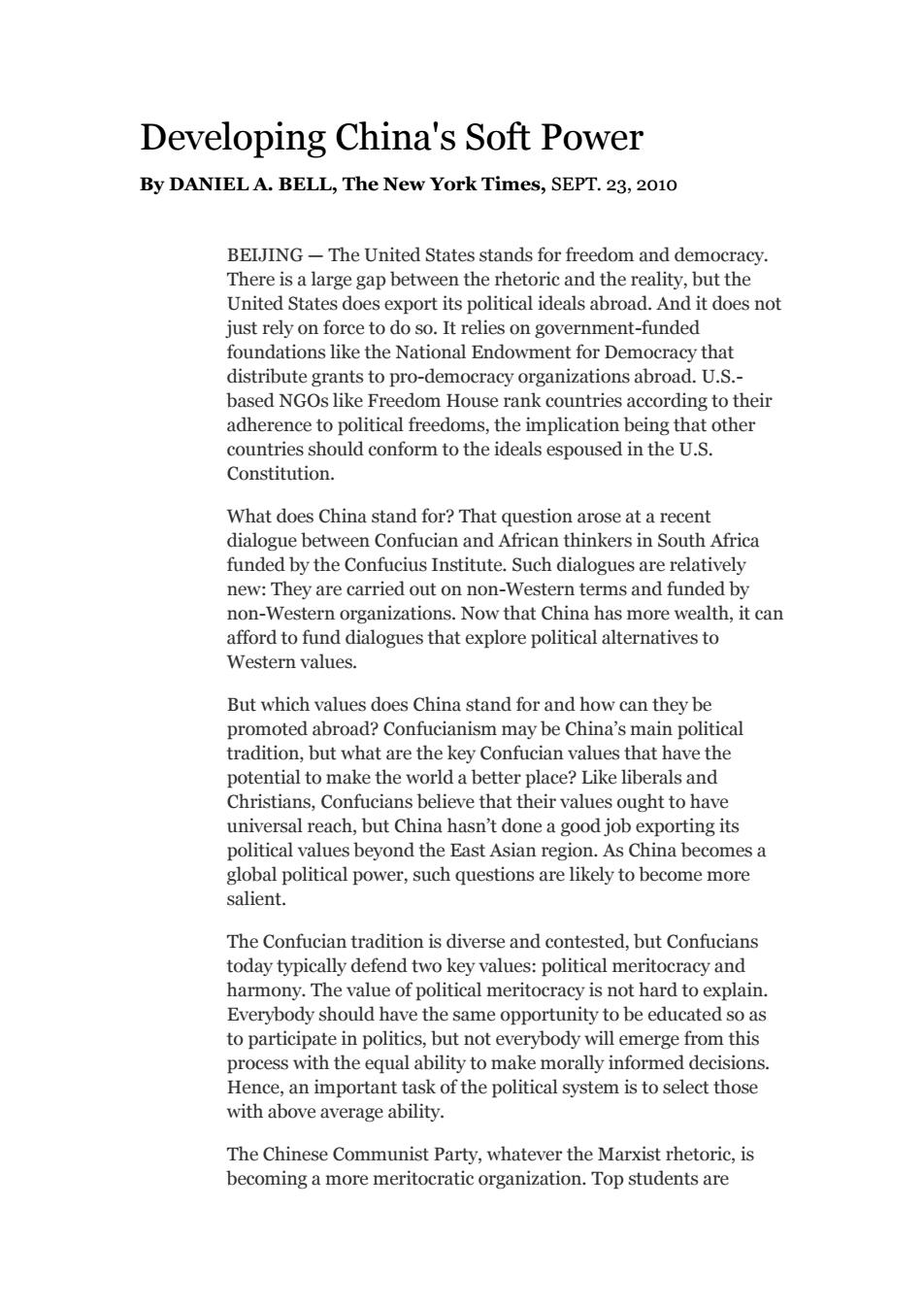正在加载图片...

Developing China's Soft Power By DANIEL A.BELL,The New York Times,SEPT.23,2010 BEIJING-The United States stands for freedom and democracy. There is a large gap between the rhetoric and the reality,but the United States does export its political ideals abroad.And it does not just rely on force to do so.It relies on government-funded foundations like the National Endowment for Democracy that distribute grants to pro-democracy organizations abroad.U.S.- based NGOs like Freedom House rank countries according to their adherence to political freedoms,the implication being that other countries should conform to the ideals espoused in the U.S. Constitution. What does China stand for?That question arose at a recent dialogue between Confucian and African thinkers in South Africa funded by the Confucius Institute.Such dialogues are relatively new:They are carried out on non-Western terms and funded by non-Western organizations.Now that China has more wealth,it can afford to fund dialogues that explore political alternatives to Western values. But which values does China stand for and how can they be promoted abroad?Confucianism may be China's main political tradition,but what are the key Confucian values that have the potential to make the world a better place?Like liberals and Christians,Confucians believe that their values ought to have universal reach,but China hasn't done a good job exporting its political values beyond the East Asian region.As China becomes a global political power,such questions are likely to become more salient. The Confucian tradition is diverse and contested,but Confucians today typically defend two key values:political meritocracy and harmony.The value of political meritocracy is not hard to explain. Everybody should have the same opportunity to be educated so as to participate in politics,but not everybody will emerge from this process with the equal ability to make morally informed decisions. Hence,an important task of the political system is to select those with above average ability. The Chinese Communist Party,whatever the Marxist rhetoric,is becoming a more meritocratic organization.Top students areDeveloping China's Soft Power By DANIEL A. BELL, The New York Times, SEPT. 23, 2010 BEIJING — The United States stands for freedom and democracy. There is a large gap between the rhetoric and the reality, but the United States does export its political ideals abroad. And it does not just rely on force to do so. It relies on government-funded foundations like the National Endowment for Democracy that distribute grants to pro-democracy organizations abroad. U.S.- based NGOs like Freedom House rank countries according to their adherence to political freedoms, the implication being that other countries should conform to the ideals espoused in the U.S. Constitution. What does China stand for? That question arose at a recent dialogue between Confucian and African thinkers in South Africa funded by the Confucius Institute. Such dialogues are relatively new: They are carried out on non-Western terms and funded by non-Western organizations. Now that China has more wealth, it can afford to fund dialogues that explore political alternatives to Western values. But which values does China stand for and how can they be promoted abroad? Confucianism may be China’s main political tradition, but what are the key Confucian values that have the potential to make the world a better place? Like liberals and Christians, Confucians believe that their values ought to have universal reach, but China hasn’t done a good job exporting its political values beyond the East Asian region. As China becomes a global political power, such questions are likely to become more salient. The Confucian tradition is diverse and contested, but Confucians today typically defend two key values: political meritocracy and harmony. The value of political meritocracy is not hard to explain. Everybody should have the same opportunity to be educated so as to participate in politics, but not everybody will emerge from this process with the equal ability to make morally informed decisions. Hence, an important task of the political system is to select those with above average ability. The Chinese Communist Party, whatever the Marxist rhetoric, is becoming a more meritocratic organization. Top students are